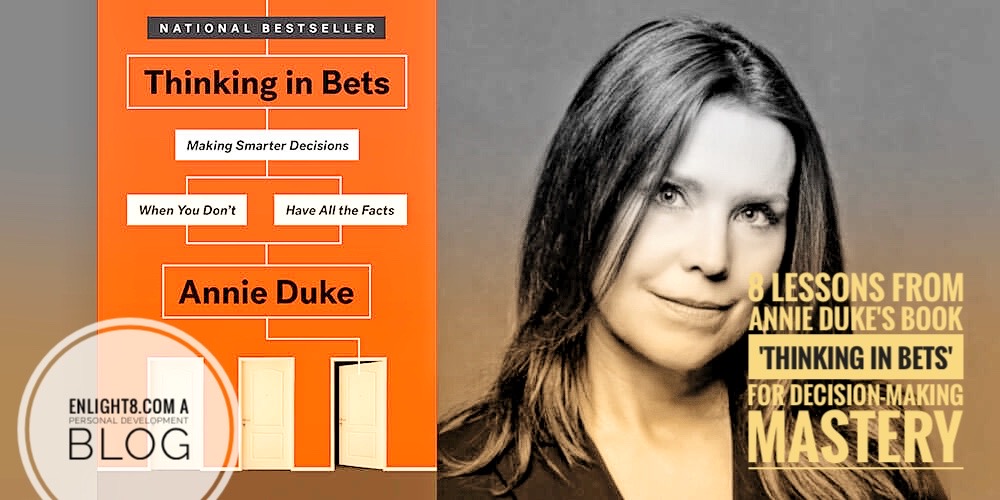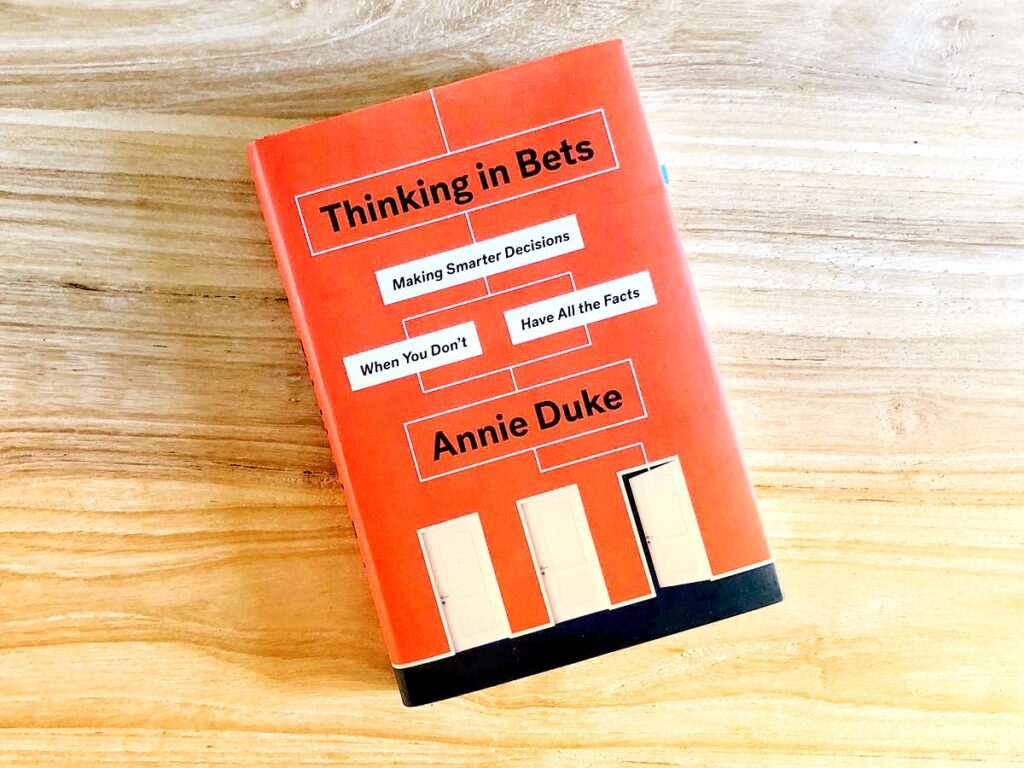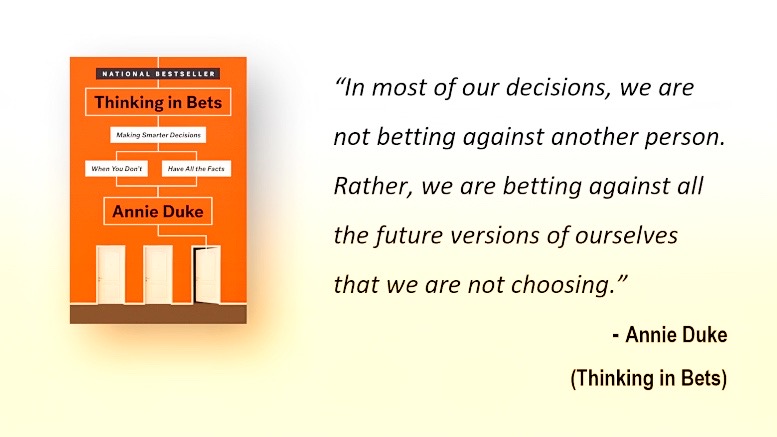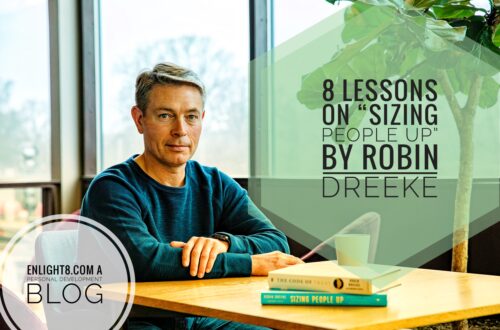
8 Lessons from Annie Duke’s book ‘Thinking In Bets’ for Decision-Making Mastery
Let’s discuss something we all face: making decisions.
In our busy lives, we often feel rushed to choose between colleges, job offers, or even what to eat for dinner, and it can be overwhelming.
I recently read a great book called “Thinking in Bets” by Annie Duke, and it changed my perspective on decision-making. Instead of just focusing on the outcome of our choices, we should think about the process we use to make those decisions.
Annie Duke is a former professional poker player and bestselling author known for her book “Thinking in Bets,” where she explores the strategic decision-making processes involved in both poker and life. With her extensive experience in high-stakes poker, she offers insights into probability, risk assessment, and how to make better decisions under uncertainty.

Duke compares our beliefs to bets – essentially, we need to consider the probabilities based on the information available. She highlights that not every result is a reflection of our skills — sometimes, it’s just luck, and that’s okay.
By adopting this mindset, we can become more thoughtful in our decision-making. We gain a better understanding of what influences our choices, and we can tweak our strategies for next time.
So, if we dive into these ideas from “Thinking in Bets,” we not only get better at making choices but also learn to be okay with the uncertainty and risks that come with life. Here are eight key lessons I learned from Annie Duke’s book, “Thinking in Bets.“
1. Separate Decision Quality from Outcome Quality
Annie Duke discusses in her book “Thinking in Bets” the concept of separating decision quality from outcome quality.
You know how we often judge our decisions just by the results they produce? It’s super easy to do! But here’s the thing: sometimes a decision that seems bad at first can lead to a great outcome because of luck. And on the flip side, a really solid decision can backfire due to factors beyond our control.
That’s why it’s crucial to focus on how we make our decisions rather than just looking at whether we won or lost. If we focus on improving our decision-making process, we can gain more insight from our experiences.
So, let’s work on creating strategies that encourage us to think things through instead of jumping to conclusions. It’s all about regularly checking in on how we come to our choices, not just celebrating wins or dwelling on losses.
By valuing the decision-making journey, we understand that outcomes can be affected by luck. And remember, the more effort we put into sharpening our skills and knowledge, the better we’ll get at making wise choices. This mindset helps us stay grounded and face uncertainty with confidence and clarity.

2. Treat Decisions as Bets
When we think of our choices as bets, we start to realize that there’s always some uncertainty about what’s going to happen next. This helps us examine the various outcomes and carefully weigh the risks and rewards, rather than relying solely on our gut feelings. It’s like being a little more strategic.
By asking ourselves what we truly know versus what we’re merely guessing, we become better at thinking critically. It’s super helpful to chat with others about our ideas, too. They might have insights that we hadn’t considered, which can expand our understanding.
In the end, thinking of our decisions as bets helps us make more intelligent choices. We learn to accept that uncertainty is a natural part of life, and we can adjust our plans as new information becomes available. Plus, it makes us more resilient when things don’t go as expected.
3. Embrace Uncertainty and Probabilities

You know how playing poker feels a lot like real life? You’re making choices with only partial information, like when you’re figuring out what to do next without having all the facts laid out. In poker, you weigh your options and make bets based on uncertain outcomes, and life can be a lot like that!
In her book, “Thinking in Bets,” Annie Duke presents one of the key ideas: thinking in probabilities instead of assuming everything is a sure thing. When you realize that life is unpredictable, it helps you avoid that tricky thing called hindsight bias. You know, that feeling that the right choice was obvious after the fact?
By focusing on how we make decisions and considering the likelihood of different outcomes, we can boost our decision-making skills. It’s all about being comfortable with the unknown and learning to embrace it. So next time you’re faced with a choice, remember: it’s okay not to have all the answers! Let’s be smart thinkers and make choices based on what we can figure out, rather than what seems obvious in hindsight.
4. Avoid “Resulting” and Hindsight Bias

How do we judge our decisions based on the outcomes? You may have heard of “resulting” and hindsight bias, and I think they’re fascinating concepts, especially if you’re trying to make better choices in life.
So, what is “resulting“? Well, it’s this tendency we have to look at the end results of our decisions and judge them based on that, rather than considering how we got there.
If something turned out great, we think we made a wise choice. But if it flopped, we might beat ourselves up about it. The truth is, we should focus more on the thought process we had at the time of making the decision. By doing so, we learn what works and what doesn’t, and we can make more intelligent choices in the future.
Now, let’s talk about hindsight bias. This idea is that, after something happens, we look back and think it was obvious that it would turn out that way. We convince ourselves that we should have seen it coming. But honestly, that’s usually not the case. Recognizing that we can’t always predict outcomes helps us understand the role of luck and uncertainty in decision-making.
So, whether things go well or not, there’s always something to learn! Embracing both our successes and failures helps us grow and makes us wiser for the next time we need to make a choice. Let’s keep that in mind as we move forward. Have you experienced this in your life?
5. Seek Truth-Seeking Groups

What are truth-seeking groups? You know, those learning groups where you can share ideas and challenge each other’s thinking? They’re fantastic for creating a space where open dialogue and different perspectives thrive!
When we come together with others who hold different viewpoints, we can uncover our own biases and sharpen our decision-making skills. In “Thinking in Bets,” Annie Duke makes such a good point about how it’s important to understand uncertainty and think probabilistically. And guess what? We can do that better when we’re surrounded by people who give us honest and constructive feedback.
Being part of these groups isn’t just about learning from others; it also helps us become more aware of our own thought processes. Annie reminds us that our decisions can feel a lot like making bets. We need to weigh the information we have and assess the risks we’re facing. By discussing our ideas in a truth-seeking group, we increase our chances of making more educated choices.
So, if you haven’t tried it yet, I encourage you to find or start a truth-seeking group. It’s such a great way to experiment with new ideas and refine our strategies.
6. Use Tools like Backcasting and Premortems
Here are some really useful planning techniques that can help us set and achieve our future goals, as outlined in the book “Thinking in Bets” by Annie Duke.
First up is backcasting. This idea is all about picturing what success looks like for us and then working backward to figure out how to get there. By visualizing our dreams, we can lay out a clear path and decide what steps we need to take. It’s a great way to set realistic milestones and think about the strategies and resources we’ll need to make those dreams a reality.
Now, let’s chat about premortems. This idea sounds unusual, but it’s a fantastic technique! It involves imagining what could go wrong with our plans before we actually dive in. By considering potential failures, we can identify challenges that could trip us up and address them directly. This way, we can improve our planning and decision-making.
Annie Duke’s book, “Thinking in Bets,” talks about how uncertainty is part of every choice we make. By considering both success and potential failure, we empower ourselves to navigate our journeys more effectively.
7. Ditch Self-Serving Bias
There is something that affects how we see our wins and losses: self-serving bias.
When we succeed, it’s super easy to think we’re the only ones responsible. We often forget about the skill, effort, and sometimes just pure luck that played a part. And then, when things don’t go our way, we might blame bad luck instead of thinking about our own choices and the risks we took. Recognizing this bias helps us understand ourselves better and make smarter decisions.
Annie Duke’s book, “Thinking in Bets,” presents an insightful perspective on this concept. She suggests that we think of our choices as bets. Instead of just looking at whether we won or lost, we should focus on how good our bets were based on the information we had at that moment. This way, we realize that a loss doesn’t always mean we lacked skill, and a win doesn’t always mean we were lucky.
By shifting our perspective on our outcomes, we can encourage our growth and learn to make better decisions in the future. Let’s continue to refine our approach and learn from both our wins and losses.
8. Develop and Follow a Rational Decision Framework

How can we make better decisions? It can be pretty tricky sometimes. But there are a few simple methods that can help us out, which author Annie Duke in her book “Thinking in Bets” refers to as frameworks.
First up is something called scenario planning. Essentially, it’s about envisioning different futures based on our decisions. Think of it as playing out all the “what ifs.” By thinking ahead, we can spot potential problems and opportunities that we might not have considered otherwise.
Another handy technique is the 10-10-10 method. This one is super easy: ask yourself how you’ll feel about a decision in ten minutes, ten months, and even ten years from now. It prompts us to think beyond the immediate moment and carefully weigh the short-term versus long-term effects. This idea can help us avoid making rash decisions that we might regret later.
Lastly, there’s a strategy called Ulysses pacts. This one is all about making commitments to ourselves. You set some ground rules ahead of time to help stick to your goals and avoid those impulse decisions. When you plan your intentions, it makes it easier to stay focused.
By utilizing these approaches—scenario planning, the 10-10-10 method, and Ulysses pacts—we can enhance our decision-making skills, leading to better outcomes in the long run.




